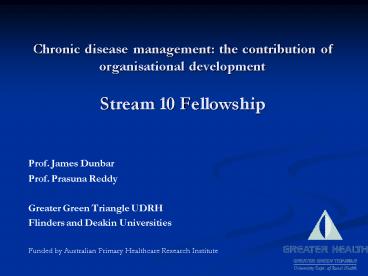Chronic disease management: the contribution of organisational development Stream 10 Fellowship
1 / 11
Title: Chronic disease management: the contribution of organisational development Stream 10 Fellowship
1
Chronic disease management the contribution of
organisational developmentStream 10 Fellowship
- Prof. James Dunbar
- Prof. Prasuna Reddy
- Greater Green Triangle UDRH
- Flinders and Deakin Universities
- Funded by Australian Primary Healthcare Research
Institute
2
What is OD?
- OD is the application of behavioural science
action research and systems theory to human
systems, to increase the internal and external
effectiveness of the organisation, especially in
managing change, using participative processes
that involve all those affected. - Rothwell Sullivan (2005) Practising
Organizational Development A Guide for
Consultants. John Wiley Sons.
3
Policy Context
- The burden of chronic disease is increasing
rapidly. General practice has a central role in
prevention, detection and management. - Implementation will require considerable change
in how teams work in general practice. (NHHRC
14.1) - OD aims to improve how individuals and
organisations perform in achieving organisational
objectives.
4
Six Core Competencies (NHHRC 14.5)
- Patient Care
- Medical Knowledge
- Practice-Based Learning and Improvement
- Interpersonal and Communication Skills
- Professionalism
- Systems-Based Practice
5
Meso system performance at VA
- Performance measurement
- Electronic medical records
- Equifinality for implementation of new
interventions - National, regional and local oversight of
performance - Incentives for managers based on performance
- Linking the efforts of operations, research and
management - Linking quality and performance
- Trialling good ideas and then operationalising
them
6
From RCT to the Bronx in five years
- Distribution money
- Training
- How to..
- Using implementers
- Tools
- Measures
- EMR and performance management
- OD
7
Key findings
- Efforts to change clinical practice by
influencing individuals have proved ineffective
unless the organisation within which they work is
ready to change. - Performance in healthcare organisations is
inextricably linked to leadership, culture,
climate and collaboration which can be improved
by OD. - We have focused on how OD can contribute to
delivering better outcomes in chronic disease
management because that is where the need is
greatest and the evidence is strong.
8
Key Findings (NHHRC 2.0)
- Remuneration systems matter.
- Collaboratives methodology used in Australia,
Canada, Netherlands and UK has been shown to
improve chronic disease management, - but
- The underdeveloped state of practice teams has
limited performance and sustainability. - Systems matter.
9
Policy Implications
- In chronic disease management, aspects that would
benefit from OD are - managing change towards multidisciplinary care
- team development, leadership, performance
- care planning, coordination, and review
- integrated primary healthcare networks
- adopting standard procedures for referral
- focusing services away from acute care onto
chronic disease management and - developing strategic partnerships at regional and
local level.
10
Policy Recommendations
- The establishment of small, expert centres for
clinical leadership - to work with leading Divisions and practices on
real change problems in real time - to optimise the delivery of chronic disease
management across organisational boundaries and - to adapt the Quality Team Development program for
Australia.
11
We would like to thank our generous American
hosts for their imparting distinguished scholarly
work
- Prof Jurgen Unutzer, University of Washington,
WA - Dr Virna Little, Institute of Family Heath NY, NY
- Prof David Marrero,
- University of Indiana, IA
- Drs Bird, Fremont, Lim, Lorenz, and Sherborne,
RAND Corp, Santa Monica, CA
- Prof Paul Batalden, Dartmouth Medical College, NH
- Prof Amy Edmondson Prof Ruth Wageman, Harvard
Business School - Prof Edwin B Fisher, University of North Carolina
at Chapel Hill - Dr Russ Glasgow,
- Kaiser Permanente Colorado

